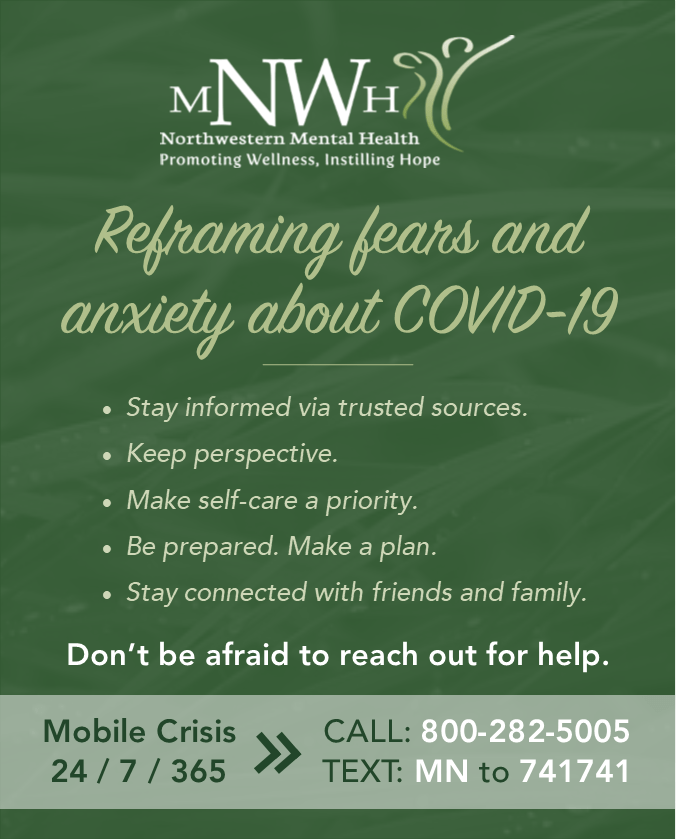The Northwestern Mental Health Center is offering tips and help for people trying to deal with the COVID-19 pandemic.
Reframing Fears and Anxiety about Coronavirus
As Coronavirus progresses closer to home, fear and anxiety about the outbreak can be overwhelming. It’s important to acknowledge the impact it has on our mental health, not just our physical health. It is natural to feel stress, anxiety, grief, and worry during and after a traumatic event. While we’re not experts on COVID-19, we can help you with tips to keep yourself emotionally healthy.
Stay Informed Through Trusted Sources
One of the best things you can do is stay informed, using trusted sources for updates. Reliable sources of information are advice and facts from the Centers for Disease Control (CDC), the Minnesota Department of Health (MDH), and the World Health Organization (WHO).
Keep Perspective
Excessive exposure to media coverage of COVID-19 can cause us to go down a path of unhelpful or unhealthy thinking. “While it is important to have basic details and facts to protect you and your loved ones, it is important to keep our perspective,” adds Janet Denison, Chief Clinical Officer at the NWMHC. “Our lives have much more happening than the current news and concerns. A balanced strategy could include: Know the facts, especially the ones most important to your unique situation, do the things you can do to keep yourself and your sphere of influence safe and well, and then go along with the rest of your whole life focusing with gratitude and hope.”
Remember to take breaks from watching the news. Focus on what you can control and do things you enjoy. If you experience intense emotions, take a deep breath, and remind yourself that these feelings will fade.
Take Care of Yourself
Self-care is even more crucial when your mental health isn’t at 100%. “Taking extra good care of ourselves whenever we are able, especially during high-stress times, will benefit you and so many others in the long run,” says Denison.
Try different ways to relax your body and mind like meditation, yoga or stretching, reading, or journaling. Eat healthy food, exercise, get plenty of sleep, and avoid drugs and alcohol. And of course, practicing good hand hygiene and cough etiquette is the best protection against respiratory illnesses such as influenza and COVID-19.
Make a Plan
Being prepared helps to minimize the anxiety of the unknown. By creating a plan when you are thinking clearly, you can reduce the stress you may feel should the outbreak impact you directly. Make a list of food, supplies, medications, and contacts you and your family need if you needed to stay home for two weeks. Talk to your kids about the plan, so they have a chance to process and prepare for what might happen. If you live alone, reach out to your support network and share your plan with someone.
Connect with Others
Sharing your concerns and how you are feeling with friends and family can be therapeutic.
Reaching out to people you trust is one of the best ways to reduce anxiety, depression, and loneliness. During times of social distancing, quarantine, and isolation, you can use email, text messaging, social media, Skype, and FaceTime to stay connected. If distress impacts your daily routine and activities, or you are experiencing symptoms of extreme stress, speak to a counselor or health care provider using the resources listed below.
If you feel like you want to harm yourself or someone else, call our 24/7 Crisis Hotline at 800-282-5005 5005 or contact a Trained Crisis Counselor by texting MN to 741741.
National Resources:
Centers for Disease Control (CDC)
World Health Organization (WHO)
National Suicide Prevention Lifeline: 1-800-273-8255
Local Resources:
Northwestern Mental Health Center
Minnesota Department of Health (MDH)
Polk County Public Health
Norman- Mahnomen County Public Health
Red Lake County Public Health









